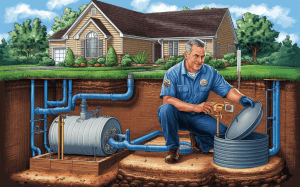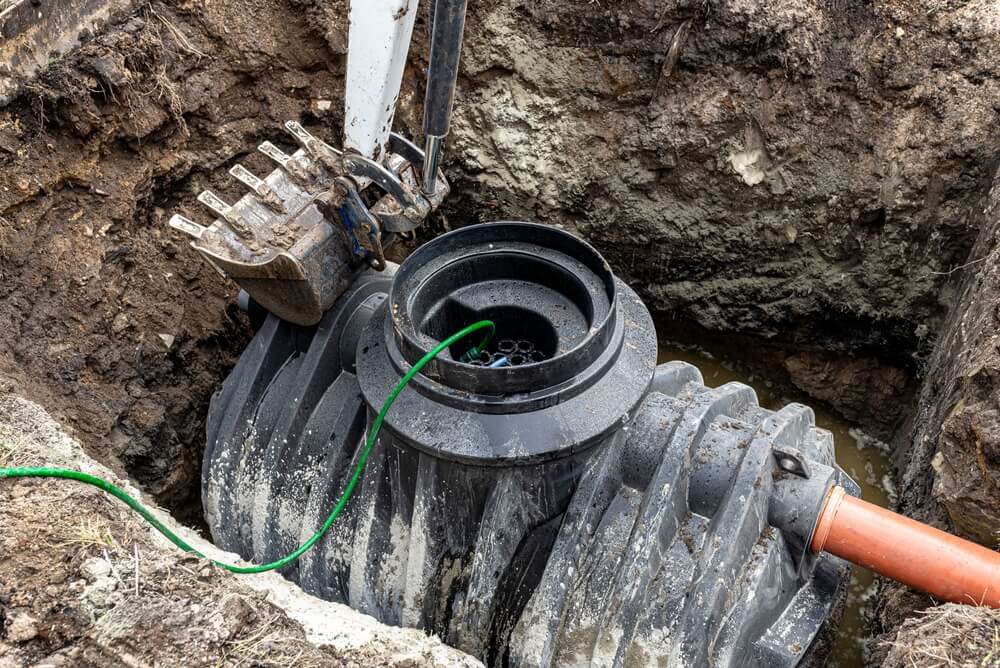How to Avoid Costly Septic Repairs: Essential Tips for Homeowners
Septic systems are an essential part of your home’s plumbing infrastructure, quietly working to process and filter wastewater. However, like any system, they require regular maintenance and attention. If neglected, septic system issues can lead to costly repairs, environmental damage, and health risks. The good news is that with proper care and regular maintenance, you can avoid expensive septic repairs and keep your system functioning smoothly for years to come.
In this article, we’ll explore some practical tips for avoiding costly septic repairs and ensuring your system operates efficiently.
1. Schedule Regular Septic System Inspections
Why Regular Inspections Matter
One of the most important steps in preventing costly septic repairs is scheduling regular inspections by a professional. A septic system should be inspected at least once every three years by a certified technician. These inspections allow professionals to spot potential problems early before they escalate into major issues.
During the inspection, the technician will check for clogs, leaks, and any signs of malfunction in the septic tank or drain field. They will also assess the overall health of your septic system and may recommend maintenance or repairs if needed. Regular inspections are an effective way to catch problems early, saving you from expensive emergency repairs down the line.
How Often Should You Have Your Septic Tank Pumped?
In addition to inspections, regular septic tank pumping is crucial. Over time, solids accumulate in the tank and can cause blockages or backups if not removed. Generally, a septic tank should be pumped every 3-5 years, depending on the size of your tank and the number of people in your household.
If you wait too long between pumpings, the sludge buildup can cause your system to malfunction, leading to costly repairs. Having your septic tank pumped on schedule will ensure it continues to work efficiently and helps to prevent backups and damage to your drain field.
2. Be Mindful of What You Flush
Understanding the Impact of Waste on Your Septic System
What you flush down your toilets or pour down your drains can have a significant impact on the health of your septic system. Many homeowners make the mistake of flushing items that can clog or damage the system, leading to costly repairs. It’s important to remember that your septic system is designed to handle organic waste, not non-biodegradable items.

Items to Avoid Flushing
– **Paper towels, napkins, and wipes**: Even though these items may seem flushable, they don’t break down as easily as toilet paper and can clog pipes and septic tanks.
– **Grease and oils**: Pouring grease or oil down the drain can cause blockages in your pipes and septic tank. These substances can harden over time, leading to significant clogs.
– **Chemicals and non-biodegradable cleaners**: Harsh chemicals, like bleach and drain cleaners, can kill the beneficial bacteria in your septic tank, preventing it from properly breaking down waste.
– **Feminine hygiene products and diapers**: These products are not meant to be flushed, as they can cause clogs and require costly repairs to remove.
By avoiding flushing these items and educating your household about proper waste disposal, you can significantly reduce the risk of septic issues and the need for expensive repairs.
3. Conserve Water to Prevent Overloading the System
How Excess Water Affects Your Septic System
Excess water usage can overload your septic system, causing it to function improperly. When too much water enters the system at once, it can prevent the solids in the septic tank from settling properly, leading to clogs, backups, and potential damage to the drain field.
Water Conservation Tips for a Healthier Septic System
– **Fix leaks promptly**: Leaking faucets, toilets, or pipes contribute to excessive water use. Repair leaks as soon as you notice them to prevent unnecessary strain on your septic system.
– **Install water-efficient fixtures**: Use low-flow faucets, showerheads, and toilets to reduce water consumption without sacrificing comfort.
– **Avoid running multiple appliances simultaneously**: Try to avoid using the dishwasher, washing machine, and shower at the same time. This helps to evenly distribute water usage throughout the day.
– **Limit water-intensive activities**: Activities like running a dishwasher or washing clothes can contribute to excess water entering the septic system. Try to spread out these activities throughout the week.
By conserving water, you’ll not only help protect your septic system from overload, but you’ll also lower your water bills and improve overall home efficiency.
4. Maintain the Drain Field Area
The Importance of a Healthy Drain Field
The drain field, also known as the leach field, plays a critical role in filtering and dispersing wastewater into the ground. Keeping the drain field area well-maintained is essential to prevent costly repairs or replacements.
How to Protect Your Drain Field
– **Avoid driving or parking on the drain field**: The weight of vehicles or heavy equipment can compact the soil and damage the pipes, causing the system to fail.
– **Keep the area clear of trees and shrubs**: Tree roots can invade the drain field and clog or break pipes. Keep the area around the drain field free from trees, shrubs, and other vegetation.
– **Don’t build structures over the drain field**: Avoid placing sheds, patios, or other structures on or near the drain field. These can disrupt the system’s function and prevent wastewater from being properly absorbed into the soil.
– **Regularly inspect the drain field**: Make sure that the area around the drain field remains level and free of pooling water. If you notice signs of wet spots or odors, it may indicate a problem with the drain field that needs immediate attention.
Taking these steps will help ensure your drain field remains effective and can handle wastewater efficiently.
5. Use Septic-Friendly Products
Why the Right Products Matter
The products you use in your home can impact the health of your septic system. Using septic-safe household products ensures that the beneficial bacteria in your septic tank remain intact and continue to break down waste efficiently. Learn about supreme plumbing & waste water here.
What to Look for in Septic-Friendly Products
– **Septic-safe toilet paper**: Choose toilet paper that dissolves quickly and is designed for septic systems.
– **Biodegradable soaps and cleaners**: Opt for environmentally friendly, biodegradable cleaning products that won’t harm your septic system.
– **Septic treatments**: Some homeowners use septic treatments to help maintain the health of the tank. However, always check with a professional before using them, as not all products are suitable for every system.
By using septic-safe products, you can protect your system from harmful chemicals and support the natural bacteria that help it function properly.
6. Know When to Call a Professional
Why Professional Maintenance is Crucial
While regular maintenance and mindful usage are important for avoiding costly repairs, there will be times when professional help is necessary. If you notice signs of septic failure, such as slow drains, foul odors, or water pooling around your drain field, don’t hesitate to call a licensed septic technician.
When to Schedule a Professional Inspection
– **Before buying a home**: Have the septic system inspected before purchasing a new home to ensure there are no existing problems.
– **When you notice warning signs**: If you experience slow drains, foul odors, or sewage backups, contact a professional right away to prevent further damage.
– **For routine maintenance**: Have your system inspected and pumped regularly by a professional to keep it in good working order.
Conclusion
Avoiding costly septic repairs requires regular maintenance, mindful water usage, and taking proactive steps to care for your system. By scheduling regular inspections, using septic-friendly products, and maintaining your drain field, you can prevent expensive repairs and keep your septic system functioning properly for years to come. If you notice any signs of septic failure, don’t hesitate to call a professional to ensure the longevity and efficiency of your septic system. https://supremeplumbingandwastewater.com.au/service/water-treatment/

